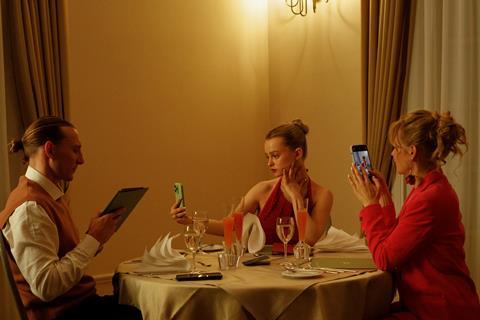Maja Bons plays a teenage star questioning her family’s social media celebrity in Joscha Bongard’s timely drama

Dir: Joscha Bongard. Germany. 2025. 98mins
Many teenagers have a rebellious phase, but few find themselves in the situation facing the heroine of German-language drama Babystar, a chilly dissection of family in the influencer age. Maja Bons stars as a beautiful 16-year-old who, along with her beautiful parents, is part of a lucrative social-media brand, and is only slowly recognising the limitations of her online stardom. German filmmaker Joscha Bongard’s feature directorial debut may not break new ground by suggesting that the picture-perfect people we see on Instagram are not, in fact, living fabulous lives, but the bleak, analytical tone nonetheless makes for a bracing experience.
A reserved approach keeps this morality tale from becoming scolding
After premiering in Toronto’s Discovery section, Babystar next screens in Zurich, Hamburg and Warsaw. In 2022, Bongard released Pornfluencer, a documentary about a porn-influencer couple, and he previously worked at a company that helped market and manage YouTube personalities. So his intimate understanding of our chronically-online era adds authenticity to a film that should attract additional festival play because of its timeliness.
Bons plays Luca, a 16-year-old who resides on a remote estate with her youthful parents Stella (Bea Brocks) and Chris (Liliom Lewald). Earning untold riches through their popular social-media handle ’our_bright_life’, the family members flaunt their seemingly amazing lifestyle while hawking products to millions of followers. But when Stella and Chris inform Luca that they’re considering having another child, which will presumably provide a huge audience boost, Luca begins having misgivings about the world in which she was born.
Much of Babystar is set within the family’s extravagant but stark home, the envy-inducing swimming pool, manicured shrubbery and cold interiors suggesting both newfound wealth and a lack of genuine connection between Luca and her parents. But while Bongard and Nicole Ruethers’s screenplay doesn’t offer many shocking surprises in its depiction of the falseness of social-media celebrity, the director’s commitment to his suffocating atmosphere creates its own kind of intrigue.
Bongard does not shy away from Babystar’s obvious cinematic reference points. Early on, Chris says to his family members, “If I don’t see you, good afternoon, good evening and good night,” a knowing callback to one of Jim Carrey’s most famous lines from The Truman Show, about a protagonist who discovers his entire existence has been for the benefit of a reality show.
Luca, too, has grown up in front of a camera — our_bright_life’s earliest videos involved her birth and even a conversation with her mom about menstruation. But as opposed to the Carrey character, Luca has long been a willing participant, which makes her reaction to this possible sibling fascinatingly opaque. Is her discontent just the usual possessiveness of an only child? Or is she worried that she’s being recast now that she’s getting older? That latter anxiety is well-founded once Luca’s parents sell her likeness to an AI company that turns her into a digital, permanently-16-year-old avatar that people can purchase to have their own personal Luca as a friend.
The film’s reserved approach keeps this morality tale from becoming scolding or smug. All three central performances boast an appealing remove, highlighting the difference between the characters’ overly bubbly rapport online and the more businesslike demeanour they exhibit around one another elsewhere. But Babystar encourages the viewer to see beyond the easy schadenfreude of watching this photogenic unit eventually unravel — instead, the film wants us to examine the ways in which all families struggle to maintain a bond in our hyper-digital modern age with many also hiding behind filters and carefully curated images.
Fittingly, Bongard and cinematographer Jakob Sinsel often shoot Luca and her parents from high angles and from a distance, almost as if they are being observed through surveillance cameras, their alienness even more pronounced. Jonas Vogler’s intentionally hollow electronic score only adds to the queasy sensation of this family as an uncanny valley of normal human behaviour. Bongard’s formal strategy is equally chilling and despairing, and when Luca finally decides to break free from her parents, the result is less liberating than sobering.
Sometimes, Babystar’s social commentary grows repetitive, and a pat ending robs the prickly narrative of some of its sting. (Plus, the picture’s opening-credits animation is jarringly reminiscent of a similar technique incorporated by the acclaimed drama series Severance.) But Bons makes Luca’s unusual predicament unexpectedly poignant. This teen craves a far-less-mediated life — but like so many young people today, she finds that escaping chronically-online culture is challenging when it’s the only reality she’s ever known.
Production company: LiseLotte Films
International sales: The Yellow Affair, contact@yellowaffair.com
Producers: Lisa Purtscher, Lotta Schmelzer
Screenplay: Nicole Ruethers, Joscha Bongard
Cinematography: Jakob Sinsel
Production design: Martha Brenner, Felicitas Puls
Editing: Emma Holzapfel, Wolfgang Purkhauser
Music: Jonas Vogler
Main cast: Maja Bons, Bea Brocks, Liliom Lewald, Joy Ewulu
























